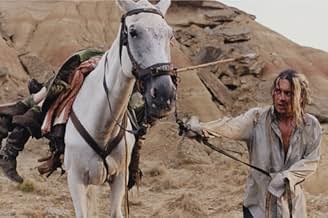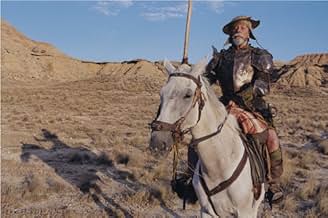IMDb रेटिंग
7.3/10
12 हज़ार
आपकी रेटिंग
अपनी भाषा में प्लॉट जोड़ेंTerry Gilliam's doomed attempt to get his film, The Man Who Killed Don Quixote (2018), off the ground.Terry Gilliam's doomed attempt to get his film, The Man Who Killed Don Quixote (2018), off the ground.Terry Gilliam's doomed attempt to get his film, The Man Who Killed Don Quixote (2018), off the ground.
- 1 BAFTA अवार्ड के लिए नामांकित
- 2 जीत और कुल 11 नामांकन
Jeff Bridges
- Narrator
- (वॉइस)
Philip A. Patterson
- Self - First Assistant Director
- (as Phil Patterson)
Benjamín Fernández
- Self - Production Designer
- (as Benjamin Fernandez)
Vanessa Paradis
- Self
- (आर्काइव फ़ूटेज)
Orson Welles
- Self
- (आर्काइव फ़ूटेज)
कहानी
क्या आपको पता है
- ट्रिवियाFulton and Pepe intended to make a television documentary about the development and pre-production of Terry Gilliam's long-awaited passion project. They had no idea that the story would develop into its own quixotic tragedy. After the project failed, Fulton and Pepe were wary of finishing their film until Gilliam said "someone has to get a film out of this. I guess it's going to be you."
- भाव
Terry Gilliam: I want to know when we're fucked in advance, not in the middle of a shoot.
- क्रेज़ी क्रेडिटAt the end of the credits we see the footage of the giants running menacingly towards the screen (which Gilliam admitted would make a great trailer). Just before it fades to black, the words "COMING SOON" are emblazoned across the screen. At the fadeout, we hear Gilliam's distinctive laugh.
- इसके अलावा अन्य वर्जनAlthough the U.S. home video version has a listed running time of 93 minutes, the version on the tape runs only 89 minutes.
- कनेक्शनFeatured in Zomergasten: एपिसोड #18.2 (2005)
फीचर्ड रिव्यू
Thanks to DVD, we've all become accustomed to seeing `inside' documentaries about the making of some of our favorite films. But what of those films that for whatever reason never end up seeing the light of day? Are there any lessons to be learned from examining the making (or near making) of those works? This is the questioned posed by `Lost in La Mancha,' a behind-the-scenes chronicle of director Terry Gilliam's attempt to fulfill his decade-long dream of bringing Cervantes' `Don Quixote' to the big screen, a project that ended up in heartbreaking, catastrophic failure for both the filmmaker and the gifted crew with which he was working.
Directors Keith Fulton and Louis Pepe did not, of course, set out to record such a debacle. Like all the people involved in the making of `The Man Who Killed Don Quixote' a film intended to star Jean Rochefort and Johnny Depp - the documentary filmmakers assumed that Gilliam and his crew would end up with an impressive finished product and that their own work would serve as little more than supplemental material on a future DVD release of the film, certainly not a theatrical release in its own right. What none of them foresaw was the series of almost Biblical disasters that would ultimately doom the film to a state of perpetual nonexistence. Flash floods, health problems, nervous investors and bottom line insurance agents all eventually conspired to prevent Gilliam's dream from becoming a reality. Thus, what became a bust for Terry Gilliam turned into a boon for Fulton and Pepe.
With the benefit of hindsight, the filmmakers ensure that the parallels between Don Quixote and Gilliam himself are never far from the viewer's mind. Gilliam, a maverick director whose movies have always tested the boundaries of the film medium, is clearly an artist and a visionary obsessed with impossible dreams of his own, but dreams that inspire those around him to strive for a greatness not always nurtured by the mundane realities of the everyday world. The fact that, in this particular case, those realities intervened to bring his vision crashing back to earth only completes the connection to the Quixote figure. Gilliam spends most of his time in this film tilting at his own windmills, only to find that the vagaries of fate are more terrifying than any giants Quixote might have imagined. The documentary also notes that Gilliam is not the only major director to have been stymied in his attempt to adapt this material; the great Orson Welles failed to complete his version of `Don Quixote' as well. The irony of these two innovative cinema giants both failing with THIS particular material pervades the film with an eerie sense of doom and foreboding.
`Lost in La Mancha' is an instructive film on a technical level, but also immensely sad on an emotional one. Because we know from the beginning that this venture is doomed to failure, even the moments of hope and optimism early on in the film carry with them an air of fatalistic melancholy. This pre-knowledge also turns the many admittedly humorous moments into genuine black comedy.
It is always painful to see genius and creativity choked off at the root, especially since the few glimpses we get of actual completed footage hint at what a fine production this `Don Quixote' might have been. As to Gilliam, one can only hope that he will continue to pursue his impossible dream despite all the roadblocks reality has set in his way. Don Quixote would have wanted it that way.
Directors Keith Fulton and Louis Pepe did not, of course, set out to record such a debacle. Like all the people involved in the making of `The Man Who Killed Don Quixote' a film intended to star Jean Rochefort and Johnny Depp - the documentary filmmakers assumed that Gilliam and his crew would end up with an impressive finished product and that their own work would serve as little more than supplemental material on a future DVD release of the film, certainly not a theatrical release in its own right. What none of them foresaw was the series of almost Biblical disasters that would ultimately doom the film to a state of perpetual nonexistence. Flash floods, health problems, nervous investors and bottom line insurance agents all eventually conspired to prevent Gilliam's dream from becoming a reality. Thus, what became a bust for Terry Gilliam turned into a boon for Fulton and Pepe.
With the benefit of hindsight, the filmmakers ensure that the parallels between Don Quixote and Gilliam himself are never far from the viewer's mind. Gilliam, a maverick director whose movies have always tested the boundaries of the film medium, is clearly an artist and a visionary obsessed with impossible dreams of his own, but dreams that inspire those around him to strive for a greatness not always nurtured by the mundane realities of the everyday world. The fact that, in this particular case, those realities intervened to bring his vision crashing back to earth only completes the connection to the Quixote figure. Gilliam spends most of his time in this film tilting at his own windmills, only to find that the vagaries of fate are more terrifying than any giants Quixote might have imagined. The documentary also notes that Gilliam is not the only major director to have been stymied in his attempt to adapt this material; the great Orson Welles failed to complete his version of `Don Quixote' as well. The irony of these two innovative cinema giants both failing with THIS particular material pervades the film with an eerie sense of doom and foreboding.
`Lost in La Mancha' is an instructive film on a technical level, but also immensely sad on an emotional one. Because we know from the beginning that this venture is doomed to failure, even the moments of hope and optimism early on in the film carry with them an air of fatalistic melancholy. This pre-knowledge also turns the many admittedly humorous moments into genuine black comedy.
It is always painful to see genius and creativity choked off at the root, especially since the few glimpses we get of actual completed footage hint at what a fine production this `Don Quixote' might have been. As to Gilliam, one can only hope that he will continue to pursue his impossible dream despite all the roadblocks reality has set in his way. Don Quixote would have wanted it that way.
टॉप पसंद
रेटिंग देने के लिए साइन-इन करें और वैयक्तिकृत सुझावों के लिए वॉचलिस्ट करें
- How long is Lost in La Mancha?Alexa द्वारा संचालित
विवरण
- रिलीज़ की तारीख़
- कंट्री ऑफ़ ओरिजिन
- भाषाएं
- इस रूप में भी जाना जाता है
- 救命吶!唐吉訶德
- फ़िल्माने की जगहें
- Bardenas Reales, Navarra, स्पेन(shooting in the desert)
- उत्पादन कंपनियां
- IMDbPro पर और कंपनी क्रेडिट देखें
बॉक्स ऑफ़िस
- US और कनाडा में सकल
- $7,32,393
- US और कनाडा में पहले सप्ताह में कुल कमाई
- $63,303
- 2 फ़र॰ 2003
- दुनिया भर में सकल
- $14,07,019
इस पेज में योगदान दें
किसी बदलाव का सुझाव दें या अनुपलब्ध कॉन्टेंट जोड़ें






























